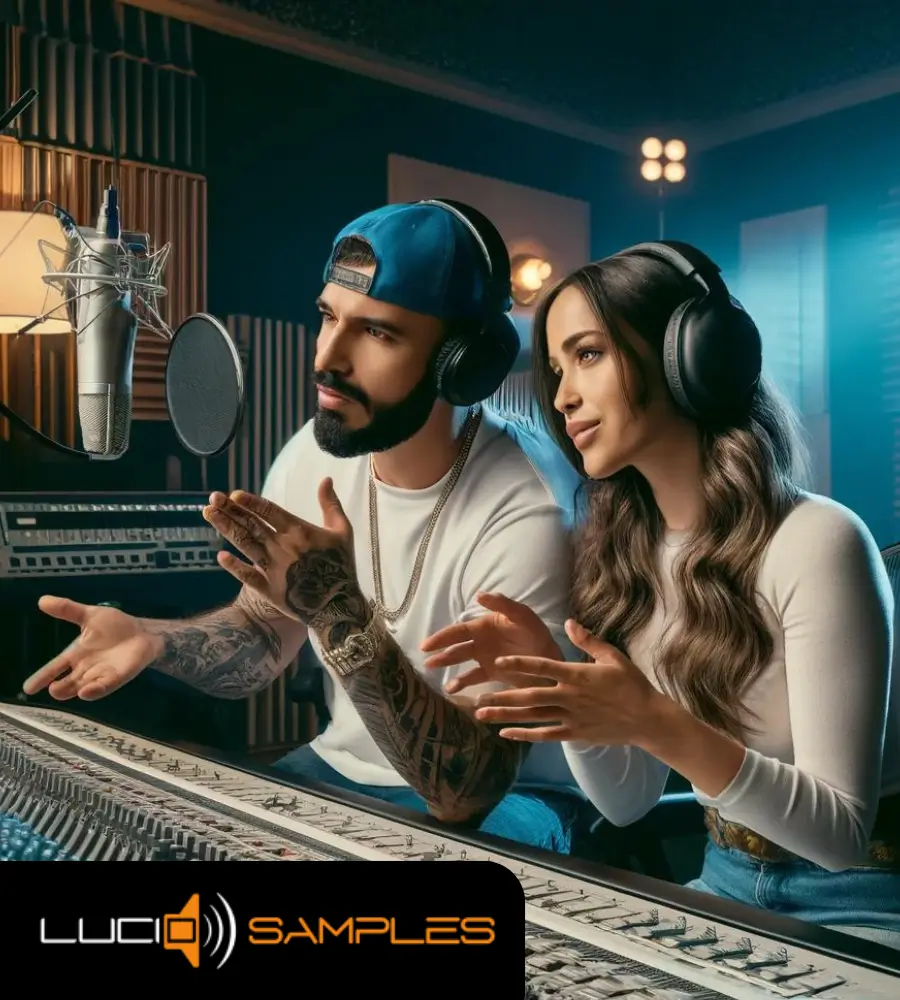Music producer collaboration is an important tool in both musicianship and audience growth. In general, it’s the process of working on a musical project with a producer. You may be the producer, or you may be the artist. Either way, there are many benefits to such kind of partnership.
Collaborating with others can enhance your sound, add something new, grow your audience and network, add skillsets together, and reduce your workload.
You can work within your own genre or sprinkle in other genres. Either way, working with someone else adds a lot to your sound and enhances the industry aspect of music creation. All you need to do is choose the right person, communicate properly to ensure a seamless process, and then get to producing.
Need to know more about this topic, its benefits, what your options are, how to find a collaborator, what the process is, how to deal with legal aspects, and what problems you may face along the way? All your answers are right here! Let’s jump into it.
Table of Contents
What is Music Producer Collaboration
It is essentially the connection of producers and other musicians to create a track or set of tracks together. It’s also widespread in the music industry. Most big-name artists collaborate with producers to enhance their sound and work with each other on track features and collaborative records.
It specifically targets the alliance between producers and other musicians. These can be artist or DJ collaborations, and even cooperations with other producers. There are many ways you can work with other people to develop new ideas and create unique sounds.
Why Collaborate?
There are tons of reasons you may want to work together with others. It’s a win-win because it opens up new opportunities in music and business. It isn’t only able to make music sound more refined. It also helps you expand your musical portfolio, increase your audience, grow your network, put together resources, and reduce your workload.
Collaboration is a beautiful and widespread thing in the music industry. It helps people get their start. It also brings fresh ideas to the table and increases your knowledge of music as a whole. In general, this is a powerful tool with many positives to gain.
Music Collaboration Goals
An important thing in producing music tohether with others is setting your goals. Not all goals are the same. So, you should think about what you want out of it before you look for a collaborator. This helps set expectations beforehand and can avoid some clashes in interest.
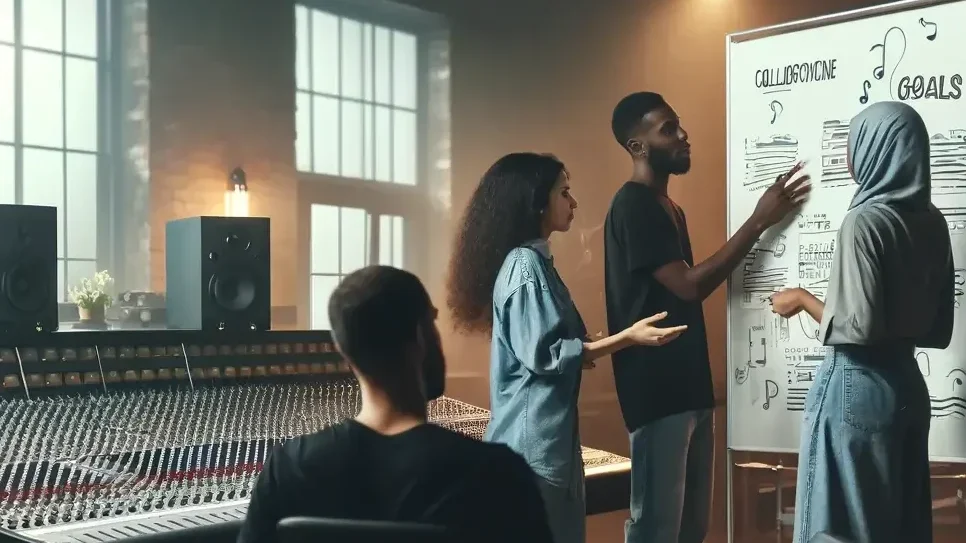
So, what is it you want out of your jump into teamwork? Do you want to change your sound? Do you want to jump into different genres to make cross-genre music? Are you wanting to expand your network and audience pool? You may want to focus solely on production or artistry. These are all benefits you can gain from being a music maker with collaboration in your portfolio.
Exploring genres
Collaborating on music with other musicians opens up a pool of sounds to explore. You can check out producers and artists who work in different genres if you don’t know what sound to move forward with. This allows you to develop your sound in a way that seems right to you.
Genres are combined frequently to create sounds that are new and exciting. Just take a look at dark trap music. Sounds from both rock and hip-hop music come together in this genre to create a hip-hop sound that’s heavier and darker.
Growing audiences
Music producer and artist collaboration is something that benefits both parties. Each musician involved in a work already has their own audience.
When working together, it puts your name and the name of the person you’re working with in front of more eyes. Not only this can help you unleash a more refined and powerful sound. They also help you to grow audiences.
If you’re looking to grow your audience, it could help to find a producer or musician that suits your sound. When you do so, you know that their audience will more likely be keen on your contributions to the project. In turn, your audience will more easily take to your collaborator’s music as well.
Combining skillsets
Maybe you’re a producer with skills to back it up, but you aren’t much of an artist in terms of vocals. Maybe it’s the opposite. Or you may prefer working with a DAW(FL Studio, Pro Tools, Logic Pro) but aren’t a fan of the recording process. Even if you can do it all, you might just not want to do it all. Or, you think your sound is great, but you want a track or so with a different flair added. All of this is okay.
The reason it’s okay is because of collaboration. Things are easier and typically turn out better when people with different or even similar skill sets come together. It allows you to focus on what you want to contribute without overdoing it.
Types of Collaborations
Music producer collab isn’t one-size-fits-all, in that different projects require different kinds of collaborations. You can work in or out of your genre or make large projects that involve videographers and similar creators.
| Type | Explanation |
| Intra-genre collaborations | The first kind of collaboration we’ll go over is intra-genre. Intra is defined as “within.” This means that it happens within the same thing. Add genre to it, it means that you both produce tracks in the same genre. If a hip-hop artist and producer work together, this would be considered intra-genre. |
| Inter-genre collaborations | Then there are the opposite, which are inter-genre collaborations. Inter means between, so this sort of cooperation happens between different genres. For example, a rock artist may work with an EDM producer to make a kind of electronic rock. |
| Cross-industry collaborations | Musicians don’t just work with other musicians. There is also the factor of collaborating with other creators. As an example, a producer might want a music video that draws attention but they don’t have those musical skills. |
In that case, they can collaborate with videographers, video editors, or video directors. In doing so, they can develop a project that’s both audibly and visually appealing. To show this, Mac Miller’s “Self Care” music video wouldn’t be the same without Christian Weber and the rest of the visual team behind it.
Finding the Right Partner
Not everyone has the same ideas and goals. If ideas and goals don’t line up, or if each partner is caught in their own vision, it might not work out. Therefore, you should take time to look for the right person to create music with. Here are some tips for doing so.
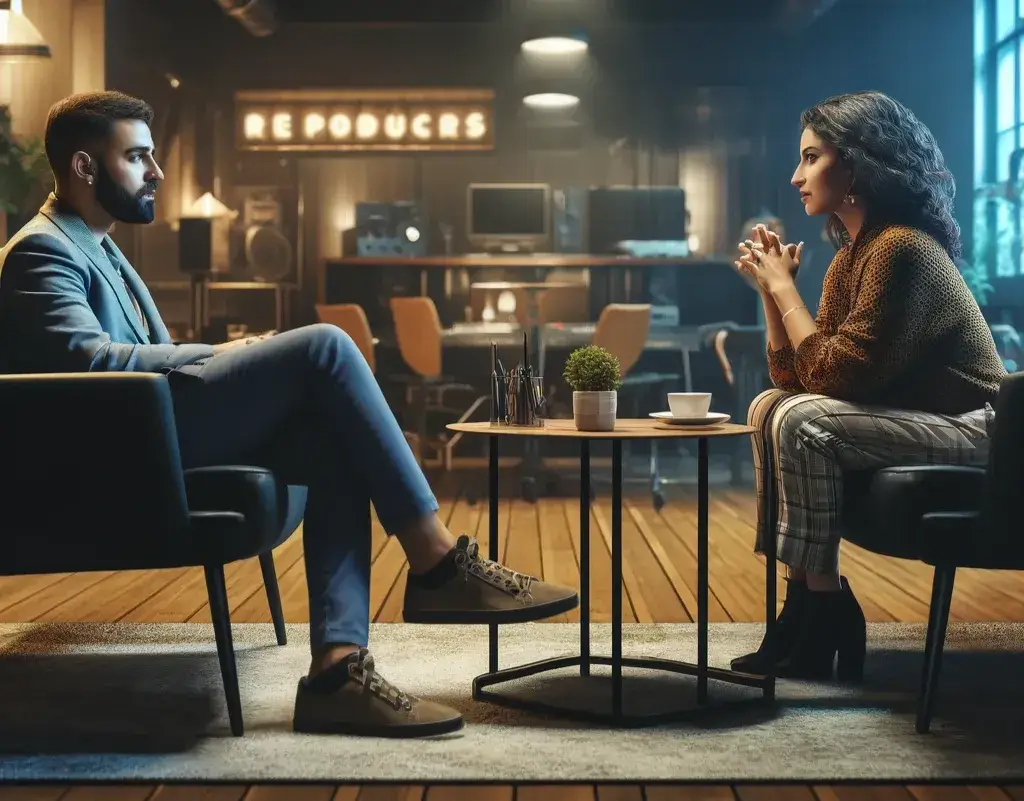
Criteria for choosing a collaborator
It helps to have criteria before you start any music project. No one is exactly the same, so not everyone has the same criteria. The first thing you want to think about is the sound. You should go for someone who fits with your sound or the sound you want on this project.
Another thing to look at is workflow. It helps to have someone with a workflow that aligns with yours. In short, you want someone with music and a flow that meshes well with yours.
Networking in Person
One option you have in finding a co-producer is in-person networking. Go to local shows, and get to know the community. It gets easier to find in-person collaborators when you get to know people. Even if you don’t find the perfect partner at a show, it can grow into further connections. Eventually, it can all lead to a partnership.
Collaboration platforms and networks
Services that let you produce music online is a powerful tool. Thanks to the internet, you can share in creation with musicians around the world. This all starts with platforms and networks.
Did you know that there are platform for musicians specifically designed to find people to make music online together? You can check out platforms like:
| Website | Our opinion |
| Kompoz | Allows musicians to collaborate online in a creative community. Great for finding collaborators for specific parts of a project. |
| SoundBetter | Offers a network of professional music production talent, including producers and mixers, to elevate your tracks to a professional level. |
| Landr | Known for its mastering services, but also offers tools for music creation and collaboration. Useful for producers looking for a polished finish. |
| ProCollabs | A dedicated music collaboration platform where musicians and producers can connect and work together virtually on new projects. |
| Join My Band | Primarily UK-based, this site is perfect for finding local musicians or bands to join, not just for online collaboration but for real-life interactions too. |
| Vocalizr | Connects vocalists with producers, making it ideal for finding the right voice for your track. |
| Soundtrap | Offers a fully online DAW that supports collaborative music-making directly in your browser. |
| Repostexchange | Platform designed for music creators to boost their presence on SoundCloud by facilitating the sharing of tracks among its members |
Each one has options for finding someone to work on music in real-time, such as songwriters, mixing engineers, sound engineers, vocalists and etc.
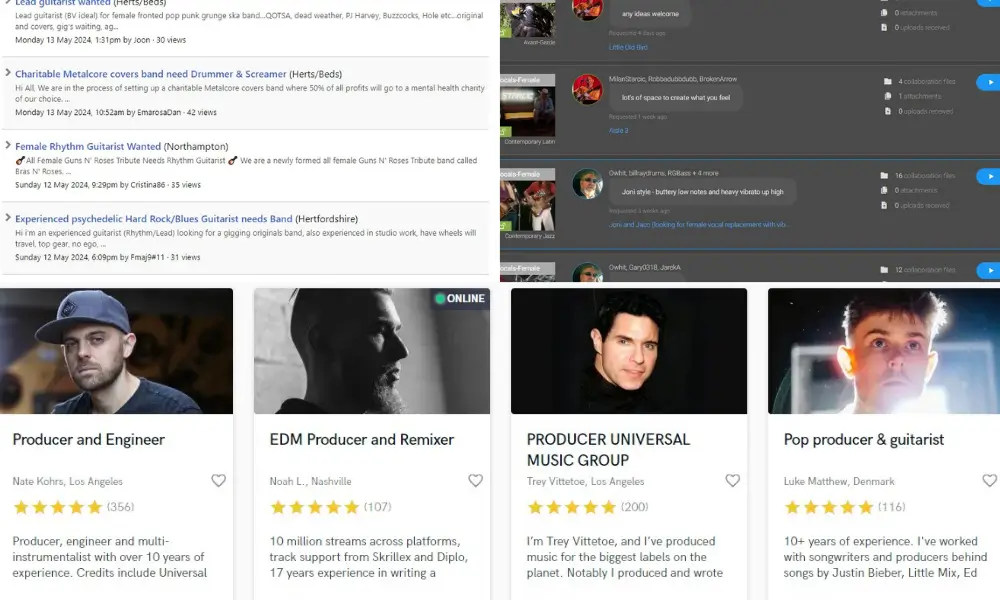
There are many approaches to finding a music production collaborator online, which means there isn’t one way to do it. It’s best to take time to explore and find what works best for you. You can then use platforms such as Pibox after finding your match. This platform has tools to make the production process more seamless.
Social Media
But also, don’t doubt the power of social networking. Here are ways to use some popular platforms to find a remote collaboration partner:
- Facebook – Facebook’s groups are powerful tools. If you hop on Facebook, you can search for groups full of musicians. Then you can network in these groups and find people to work together with.
- Instagram – Start following musicians big and small on Instagram. If you find someone with a sound you like, then message them. There’s no harm in seeing if they may want to work with you. Just make sure there is a way they can find your current music. Or, you can make it known in your bio that you want to work on music or beat with someone.
- Twitter: Twitter is a similar space. Follow musicians and producers, and get to know people. Look for posts of others wanting to collaborate, or message around. Just make sure to be active in music communities, and this will expand your network.
You can also go on Discord and find servers full of producers and musicians. Or, you can search for different kinds of music creators on LinkedIn. Social networks and apps are perfect for networking to find someone to work with. Also a streaming platforms, such a Spotify, Apple Music are a good way to find someone with right skills and talents.
Clear communication and shared goals
Communication should be kept clear and to the point. In any type of collaboration, there has to be a healthy back and forth. It is a good idea to be open to ideas and not fear giving your own input. Remember, this is a team effort. If someone wants more control of the project, it should be stated at the start. Even if that person is you, be prepared to give some sort of leeway. By doing so, you can create a project everyone is proud of.
Process
So, you’ve found the perfect person to work with for your next track. Where do you go from here? Well, it’s time to create. The producing phase should primarily focus on the music given everything else is in order.
Pre-production
Pre-production has to do with everything that comes before. The main question to ask yourself during pre-production is “What’s the plan?” You may come into things with an idea in mind, or not.
During pre-production, it’s time to refine whatever idea you have. If you have no idea, it’s time to work with your partner to brainstorm and get ideas on the table. A good pre-production ends with a demo recording to use moving forward. By the end of this phase, your objectives should be set.
Production
Then it’s time to get into the meat of music creation, the production phase. This process has a few different steps:
- Writing – The first step is writing the track. If the demo is fully fleshed out, there may not be much work to do. Maybe you want to change some lyrics. Or, a full revision could be necessary. To start, it’s best to write out ideas.
- Arrangement – This job falls into the lap of the producer or producers. The producer takes their samples and loops and arranges them in a DAW to avoid repetition. The producer may also make their own loops with MIDI samples to round out the sound.
- Recording – Then it’s time to record and track vocals and other instruments. In this phase, you get your gear together. Things can be edited, but it’s best to have the recorded tracks be as seamless as possible. By doing so, the rest of the process is easier.
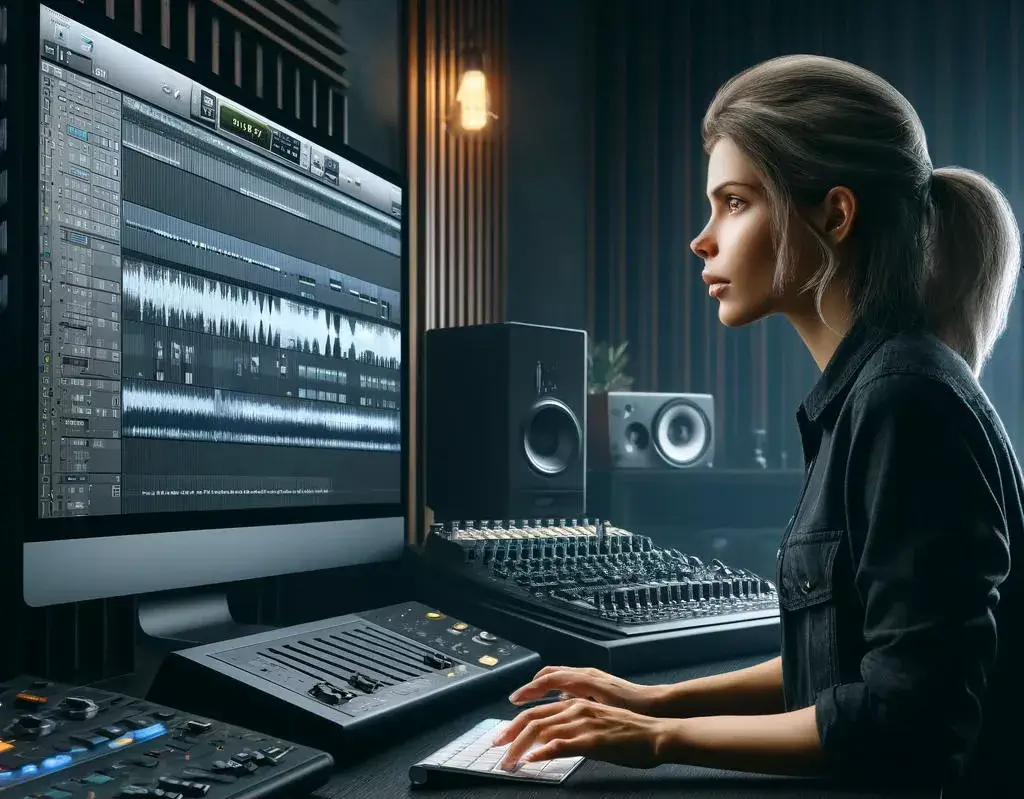
This phase takes a lot of working together to get the right sound. If a proper workflow is set, it should be simple. You can do this in a studio or a home studio. It’s just important to make sure your equipment captures the right sound and that you get good recordings.
Post-production
After the production stage, it’s passed off primarily to the producer. Post-production involves mixing and mastering. In the mixing phase, the producer balances audio levels’ dynamics and left and right panning. Proper mixing helps every bit of instrumentation and production pop out with clarity.
Then things are passed off into mastering, the final step in music production collaboration. Mastering references equalization, compression, limiting, and other production tools. A good master assures the best quality a track can have. It catches any issues in audio and cleans them up. Then it’s all about making sure playback sounds good no matter what the track is played on.
Make sure to get good feedback throughout post-production to have a good idea of what your team and others think.
Legal Aspects and Agreements
Setting up legal terms in music collaboration seems scary, but it is important at times and sets proper expectations for each party. If there is no written deal, every person working on a project co-owns said project. This means everyone involved has the rights to it and each gets an equal share.
This is generally a fine agreement, but maybe one person wants the rights to the track. Or, a partner could put more effort into the track and deserves compensation. A legal agreement goes over all of this and more.
A good legal agreement covers who does what in a project, who has ownership, who is the head of the project, and how each collaborator is compensated. It also goes over what happens if someone has to drop out of the project for any reason.
When expectations are set through a legal agreement, more focus can go into the music when creating and producing. That being said, it may be hard to write up this sort of agreement as a musician. It’s best to enlist the help of a lawyer to make sure the written agreement is clear and gives the right idea.
Challenges in Collaboration
Collaboration isn’t always an easy process, and there may be some challenges along the way. These are some common challenges you may face while collaborating:
- Creative differences: A frequent challenge to good cooperation is creative differences. One producer might feel like something should sound one way, and the other might not see that vision. Cases like these require a back-and-forth. Maybe try both options to see what sounds best. Or, find some sort of middle ground. Either way, in this case, compromise is necessary on every side. When good compromise is found, good work is created.
- Clashes in ego – The world of music is filled with big egos. And big egos clash sometimes. You may find that who you’re working with has a large ego to match yours. Two large egos put together can create conflict. In this case, music production collaborators should keep their egos in check to promote teamwork.
- Legal aspects: Remember when we went over legal agreements? That’s because it can help to avoid later challenges. Without a contract, there can be arguments over who has rights and who gets what pay. With a contract, it’s already set in stone.
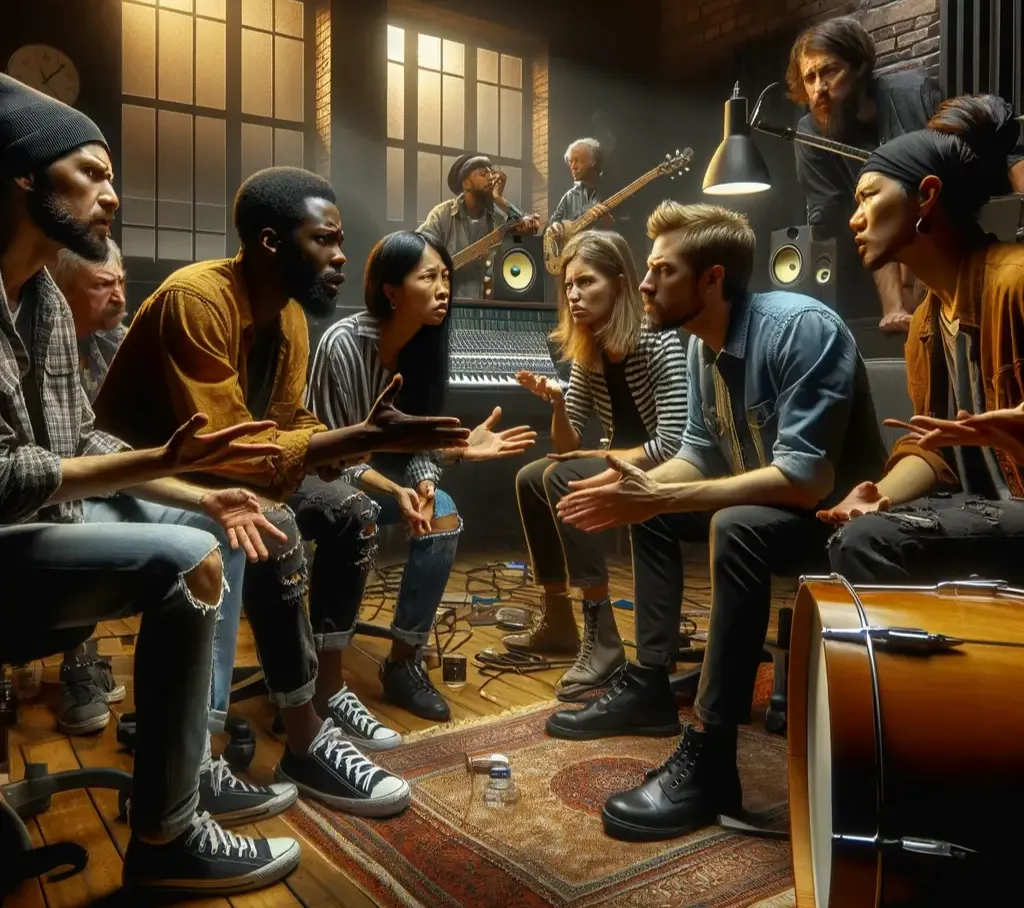
Being the bigger person assists in cases of collaboration challenges. Sometimes you need to let someone else take the reins. Or, you might need to move on to another partnership that works better for you. Just be prepared for challenges. Then you can get through the project whether they do or don’t happen.
Summary
So, there’s everything you need to know about music producer collaboration in 2024. It is the process of a collaborator and another musician working together on a track or project. It opens opportunities, refines your music, and adds to your discography.
Just know your goals. Whether you want to try new genres, grow your audience, or combine skills, collabs can help. You can work within or outside of your normal genre. Or, you can work with other kinds of creators on music videos and similar projects.
To simplify the process, you should find a co-producer first. This can be done in person or online. Once you find someone, you should discuss goals and set a solid line of communication.
Once communication is set, you can jump into producing. In this phase, there is the pre-production, or planning. Then it moves to production which is more about arranging and recording. Then in post-production, the mix and master refine the track.
Having a legal agreement helps avoid future clashes. However, there can be issues with creative differences, ego clashes, and legal issues having to do with rights and pay. Being prepared for such issues helps you in the process.
This isn’t really scary when it comes down to it. A good collaborative project should be fun, and it should have a tight flow to it. Now you’re a bit more prepared for your first collaboration. Follow this guide, and you’ll be on track to making a truly exciting project.

